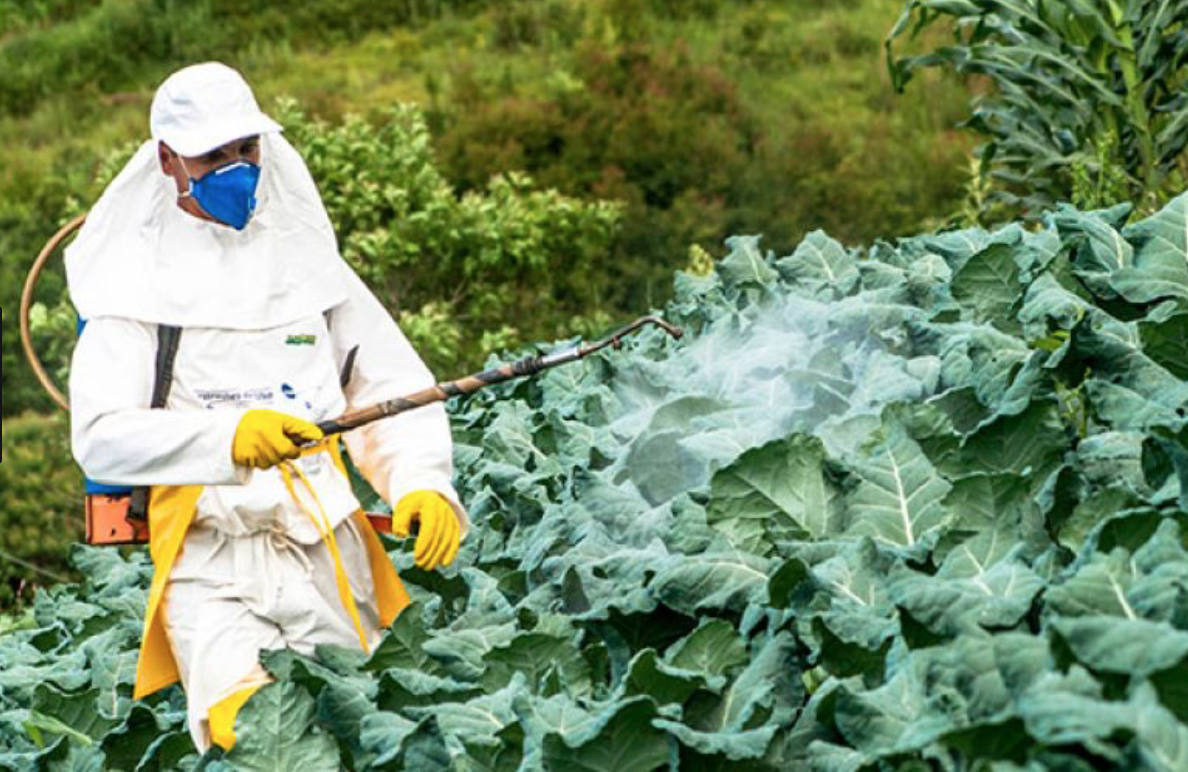Pesticides, herbicides, fungicides, insecticides and disinfectants have become commonplace practice in the last century and only now are being recognized for their greater negative impact on humans and our environment.
Pesticides, etc. are a broad class of substances used to reduce or eliminate certain plants, molds and insects that may damage crops and thus impinge on profit margin for farmers and corporations.
The residues of these substances are found everywhere: traces of ‘Round up’ are found in your organic arugula salad and most organic and certainly most (if not all) non-organic foods. Many (70 or more) widely used pesticides are classified as probable or possible carcinogens.
The residue of chemicals from pesticides, etc. drastically diminishes a healthy intestinal flora and thus weakens our immune system, as a healthy intestinal flora is the first instance of our immune function. In other words it can open the door for many other disease to arise when our immune function is weakened.[1]
Many pesticides, fungicides, insecticides, etc. are designed to shut down the mitochondria (the energy producing factory within the cell) of the plants and insects, which in succession induces cell death.[2]
Unfortunately, this mechanism works the same way in humans: we ingest small amounts of pesticides in our food and our mitochondria will be attacked in the same way as the plants and insects. We are generally larger in size than the plants or insects, thus the pesticides do not impact us as imminently, however there is an accumulative effect.
Pesticides are known to contribute to the rise of certain cancers, especially non-Hodkin’s lymphoma, leukemia, multiple myeloma and soft tissue sarcoma (and others). They are also known for their contributing effects on depression, hormonal imbalances and other mental/emotional disorders.
In a downstream effect we also impair the natural balance of our environment, even to the point where we possibly risk our food supply: bees are our #1 pollinators and certain pesticides have a harmful effect on bees, especially their larvae.
When you grow your own food — and I encourage everyone to do so -, I would suggest avoiding pesticides or if necessary looking for natural alternatives to eliminate pests using natural ingredients such as vinegar, lemon and essential oils for example. Also lawn care is best to be natural –‘Round up’ residue otherwise will trickle into our ground water and ultimately end up in our drinking water supplies.
The quality of the soil in the garden/yard also makes a difference: better and healthier soil equals stronger and healthier plants with less damage arising from insects and other pests and weeds. Keeping a few weeds in the garden and yard, actually strengthens the plants — monoculture makes plants more vulnerable to be invaded by insects/bacteria, etc.
Monoculture in the farming sector is unfortunately also a reflection of the monoculture of the modern mind: the starkness, lackluster and boredom of the mind that is largely preoccupied with making a living (or escapism). We are being fed a (tem)plate of constant fear: fear of the ‘pests’ — which plays out in our lives as fear of not having enough resources (like money, food, shelter, healthcare, love, education, etc.).
The root of this fear is not feeling good enough about oneself — a belief in being sinister at the core of the being. The outside world seemingly always reinforces this false belief. The truth is, however, that our inherent goodness and value cannot gain footing in our reflection of our outside world as long as we are stuck in a fear-loop that solely allows us to see threats reflected everywhere we turn.
Ultimately the mind becomes dull from overextended indulgence in this kind of monoculture (land)scape. How about exploring new ways of doing, being and thinking? Even if just for a moment: leaving the fear behind, allowing space for some weeds to grow and insects to fly, knowing that they are in fact necessary for the health of the overall crop that is meant to be harvested.
Going back to the practical end once again: if you can buy local, organic food, it is a good practice to do so and encourage your regular farmer neighbors to reduce or eliminate the use of pesticides, etc. — conversations and requests create a change in behavior.
If you do not have access to organic produce/foods, soaking and/or properly washing foods can somewhat reduce exposure to these toxins.
In my opinion, in order to end the desert of the mind of our world society: healthy, organic, natural and wholesome food should be a right to every person, not a commodity. Inspiration begins where fear ends.
As long as basic food is sold and distributed as a commodity, profit margin practices and exploitation practices will be the norm. These practices destroy our living environment, our health and our mental/emotional capacity to become the genial inventors, think tanks and brotherhood of humanity we can potentially become. Let us create greater change one individual at a time to enjoy each other and our planet for as long as possible.
[1] Samsel, A., and Seneff, S. 2013. Glyphosate’s Suppression of Cytochrome P450 Enzymes and Amino Acid Biosynthesis by the Gut Microbiome: Pathways to Modern Diseases. Page 1443. Entropy, 15, 1416–1463; doi:10.3390/e15041416
[2] Kim, Y.H.; Hong, J.R.; Gil, H.W.; Song, H.Y.; Hong, S.Y. 2013. Mixtures of glyphosate and surfactant TN20 accelerate cell death via mitochondrial damage-induced apoptosis and necrosis. Toxicol. In Vitro, 27, 191–197.





